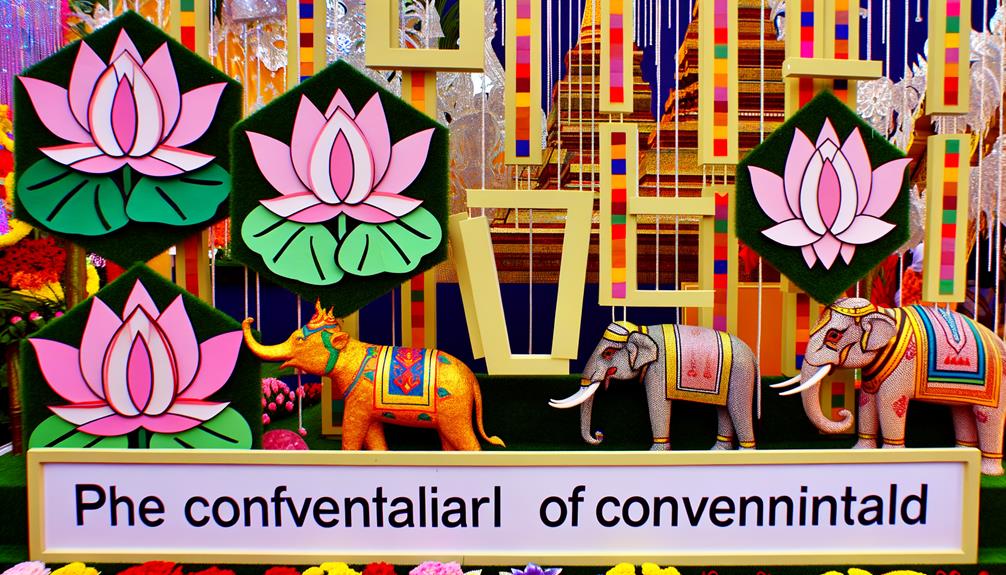Thai Name Meaning in English
Thai names are imbued with deep historical, spiritual, and cultural significance. They reflect societal aspirations, virtues, and familial lineage, often derived from Pali or Sanskrit.
The naming process, influenced by Hinduism, Buddhism, and animism, involves monks or astrologers to guarantee auspiciousness. Thai names are often extended for politeness and incorporate royal connotations.
Translating these names to English requires careful consideration of linguistic nuances and cultural context, preserving rich meanings such as 'Somchai' for 'man of worth' or 'Malee' for 'flower.' Understanding the layers of significance in Thai names reveals a profound connection to heritage and identity. Learn more about the intricate cultural rituals surrounding Thai names.

Key Takeaways
- Thai names often originate from Pali or Sanskrit words, rich in auspicious meanings and cultural significance.
- Names like 'Somchai' mean 'man of worth,' reflecting societal values and personal aspirations.
- Nature-inspired names such as 'Malee' translate to 'flower,' symbolizing beauty and purity.
- Names like 'Anurak' mean 'guardian or protector,' showing reverence for ancestral and spiritual protection.
- Translating Thai names to English requires preserving cultural nuances and ensuring phonetic accuracy.
Cultural Significance of Thai Names
The cultural significance of Thai names is deeply rooted in the country's rich tapestry of historical, spiritual, and social traditions, reflecting a blend of ancient beliefs and modern influences. Names in Thailand are not merely identifiers but carry profound meanings that often signify aspirations, virtues, and familial lineage.
Historically, Thai names have been influenced by Hinduism, Buddhism, and indigenous animistic practices, embedding them with spiritual connotations. Naming rituals are infused with ceremonial importance, where monks or astrologers frequently play a pivotal role in selecting auspicious names.
Socially, names can denote class, occupation, and regional heritage, creating a distinct identity for each individual. This intricate naming culture underscores the collective values and cosmological perceptions prevalent in Thai society.
Common Elements in Thai Names
Thai names often feature distinct linguistic elements that reflect the rich cultural heritage and societal norms of Thailand.
Surnames were introduced only in the early 20th century, yet they hold significant meaning, often derived from ancestral lineage or occupational titles. Common components in Thai names include auspicious words from Pali or Sanskrit, indicating virtues, prosperity, or natural elements.
Names are sometimes elongated to convey respect or importance, and may include royal connotations to elevate social status. Nicknames, often given at birth, are also culturally significant, providing an intimate glimpse into familial affection or individual traits.
Understanding these elements offers a deeper appreciation of the intricate layers embedded within Thai personal identities and their societal interactions.
Translating Thai Names to English
Understanding the essential elements of Thai names provides a foundation for effectively translating them into English. This process involves careful consideration of linguistic nuances and cultural context. Thai names are often rich in meaning, incorporating elements such as auspicious symbols, ancestral homage, and personal aspirations.
When translating, it is pivotal to maintain these cultural and semantic layers. For instance, the name 'Anurak,' signifying 'protector' or 'guardian,' should preserve its connotations in English. Additionally, phonetic challenges arise due to tonal differences between Thai and English, necessitating a balance between accurate pronunciation and readability.
Ultimately, translating Thai names to English requires a nuanced approach that respects the original name's cultural heritage while ensuring clarity and coherence in the target language.
Popular Thai Names and Meanings
Exploring popular Thai names reveals a tapestry of cultural significance, where each name encapsulates elements such as virtue, nature, and ancestral reverence.
Names like 'Somchai' (สมชาย) translate to 'man of worth,' reflecting societal values of integrity and respect.
'Preeda' (ปรีดา), meaning 'joy,' underscores the cultural emphasis on happiness and well-being.
Nature-inspired names such as 'Malee' (มาลี), meaning 'flower,' highlight a deep connection to the natural world.
Additionally, names like 'Anurak' (อนุรักษ์), meaning 'guardian or protector,' often signify ancestral reverence and familial duty.
These names serve as cultural artifacts, offering insights into the values and principles cherished by Thai society, revealing a profound connection between language, identity, and heritage.
Choosing a Thai Name
Selecting a Thai name involves a nuanced understanding of cultural values, linguistic intricacies, and personal significance, making it a deeply meaningful process. Names in Thai culture are not chosen arbitrarily; they reflect familial heritage, astrological beliefs, and societal roles.
Parents may consult monks or astrologers to guarantee the name is auspicious, aligning with the child's birthdate and time. Linguistically, Thai names often incorporate elements that signify virtues, such as strength or beauty, and can combine Pali, Sanskrit, and Thai words.
The process underscores a profound cultural ethos, where names serve as more than identifiers, but as symbols of identity and destiny. Understanding this practice requires appreciation of the cultural and spiritual dimensions inherent in Thai society.
Conclusion
In the intricate tapestry of Thai culture, names serve as more than mere identifiers; they are imbued with deep cultural, spiritual, and familial significance.
Much like a traditional Thai silk weaving, each name is a blend of history, meaning, and intention, meticulously chosen to reflect individual identity and societal values.
This cultural practice underscores the importance of understanding Thai names, not just as linguistic elements, but as vibrant threads in the broader cultural and historical fabric of Thailand.






